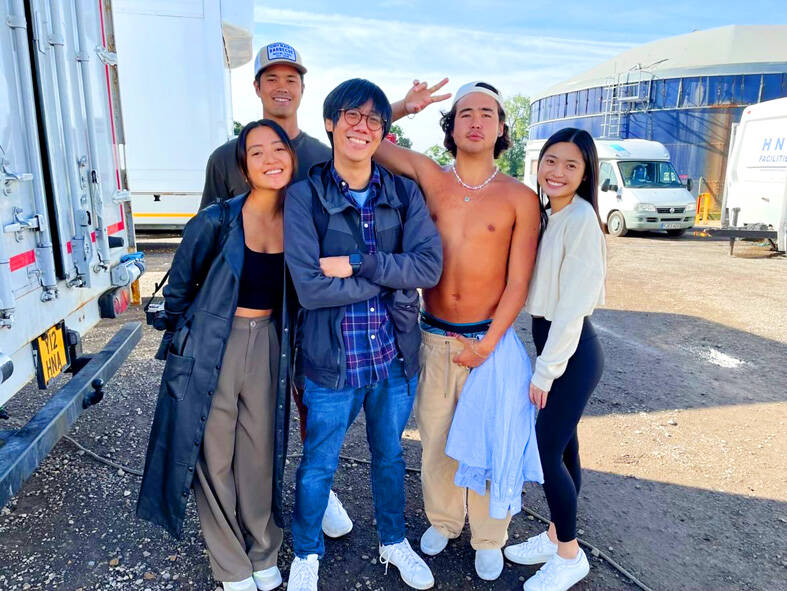For Taiwanese-American director Arvin Chen (陳駿霖), his new movie Love in Taipei (愛在台北) not only defines the Taiwanese capital as an unconventional romantic destination, but also represents an important step for Asian-American movies seeking to find a place in mainstream cinema.
Chen said he sees growing possibilities in movies featuring Asian Americans, adding that instead of more traditional topics such as race and family, those related to young adults, for instance, have managed to find an audience.
“The YA [young adult] genre now has an Asian version,” Chen said, adding that his movie has an all-Asian cast, while backstage staff from Asia, including from Taiwan, made a significant contribution.

Photo courtresy of Arvin Chen via CNA
Love in Taipei — which stars Ashley Liao (廖艾莉), Ross Butler and Taiwan-based television personality Janet Hsieh (謝怡芬) — premiered on Thursday in the US and Canada on streaming platform Paramount+.
Filmed in Taipei in late 2021, the movie is an adaptation of a novel by Abigail Hing Wen (邢立美) which tells the story of a young Asian-American woman who is sent from Ohio to Taiwan by her parents to study Mandarin in a cultural immersion program.
While there, she finds herself trying not to fall for two attractive boys who are vying for her attention, while simultaneously finding the courage to defy her parents’ high expectations and pursue her true passion, dancing.
The movie includes several of Taipei’s iconic landmarks, including the Grand Hotel and the Taipei 101 skyscraper, as well as many bustling night markets.
Chen, 44, earned a master’s degree in film production at the University of Southern California, and his film Au Revoir Taipei (一頁台北) won the Best Asian Film Award from the Network for the Promotion of Asian Cinema at the 2010 Berlin International Film Festival.
He said that as an Asian American who grew up in California, it was difficult to imagine 10 years ago that movies of this kind could make it to streaming platforms.
Chen also praised Taiwan’s film industry as being highly established, making it easy for professionals from the country and the West to work together.
“It is something I am kind of proud of,” he said.
However, there were many challenges making the film in Taipei, Chen said.
Among them was the COVID-19 pandemic, which meant the crew needed special visas due to Taiwan’s strict border controls, said Chen,
Another great challenge was maintaining an American vibe in the movie even though it was filmed in Taiwan, he said.
Chen said he made Taipei look more romantic in the film, such as by shooting a night market scene at a studio in the city’s Bopiliao Historic Block in Taipei’s Wanhua District (萬華) instead of at a real market.
Still, his team drew much inspiration from the Taipei lifestyle, which made the story more colorful, he said.
“Since I visited Taipei to shoot movies in my early days, I have always felt that it is a city full of charisma,” he added.

TRAFFIC SAFETY RULES: A positive result in a drug test would result in a two-year license suspension for the driver and vehicle, and a fine of up to NT$180,000 The Ministry of Transportation and Communications is to authorize police to conduct roadside saliva tests by the end of the year to deter people from driving while under the influence of narcotics, it said yesterday. The ministry last month unveiled a draft of amended regulations governing traffic safety rules and penalties, which included provisions empowering police to conduct mandatory saliva tests on drivers. While currently rules authorize police to use oral fluid testing kits for signs of drug use, they do not establish penalties for noncompliance or operating procedures for officers to follow, the ministry said. The proposed changes to the regulations require

The Executive Yuan yesterday announced that registration for a one-time universal NT$10,000 cash handout to help people in Taiwan survive US tariffs and inflation would start on Nov. 5, with payouts available as early as Nov. 12. Who is eligible for the handout? Registered Taiwanese nationals are eligible, including those born in Taiwan before April 30 next year with a birth certificate. Non-registered nationals with residence permits, foreign permanent residents and foreign spouses of Taiwanese citizens with residence permits also qualify for the handouts. For people who meet the eligibility requirements, but passed away between yesterday and April 30 next year, surviving family members

China Airlines Ltd (CAL) yesterday morning joined SkyTeam’s Aviation Challenge for the fourth time, operating a demonstration flight for “net zero carbon emissions” from Taiwan Taoyuan International Airport to Bangkok. The flight used sustainable aviation fuel (SAF) at a ratio of up to 40 percent, the highest proportion CAL has achieved to date, the nation’s largest carrier said. Since April, SAF has become available to Taiwanese international carriers at Taipei International Airport (Songshan airport), Kaohsiung International Airport and Taoyuan airport. In previous challenges, CAL operated “net zero carbon emission flights” to Singapore and Japan. At a ceremony at Taoyuan airport, China Airlines chief sustainability

‘ONE CHINA’: A statement that Berlin decides its own China policy did not seem to sit well with Beijing, which offered only one meeting with the German official German Minister for Foreign Affairs Johann Wadephul’s trip to China has been canceled, a spokesperson for his ministry said yesterday, amid rising tensions between the two nations, including over Taiwan. Wadephul had planned to address Chinese curbs on rare earths during his visit, but his comments about Berlin deciding on the “design” of its “one China” policy ahead of the trip appear to have rankled China. Asked about Wadephul’s comments, Chinese Ministry of Foreign Affairs spokesman Guo Jiakun (郭嘉昆) said the “one China principle” has “no room for any self-definition.” In the interview published on Thursday, Wadephul said he would urge China to